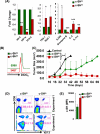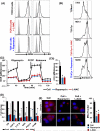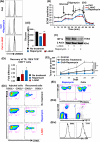Promoting thiol expression increases the durability of antitumor T-cell functions
- PMID: 25164014
- PMCID: PMC4216764
- DOI: 10.1158/0008-5472.CAN-14-1084
Promoting thiol expression increases the durability of antitumor T-cell functions
Abstract
Ex vivo-expanded CD8(+) T cells used for adoptive immunotherapy generally acquire an effector memory-like phenotype (TEM cells). With regard to therapeutic applications, two undesired features of this phenotype in vivo are limited persistence and reduced antitumor efficacy, relative to CD8(+) T cells with a central memory-like phenotype (TCM cells). Furthermore, there is incomplete knowledge about all the differences between TEM and TCM cells that may influence tumor treatment outcomes. Given that TCM cells survive relatively longer in oxidative tumor microenvironments, we investigated the hypothesis that TCM cells possess relatively greater antioxidative capacity than TEM cells. Here, we report that TCM cells exhibit a relative increase compared with TEM cells in the expression of cell surface thiols, a key target of cellular redox controls, along with other antioxidant molecules. Increased expression of redox regulators in TCM cells inversely correlated with the generation of reactive oxygen and nitrogen species, proliferative capacity, and glycolytic enzyme levels. Notably, T-cell receptor-transduced T cells pretreated with thiol donors, such as N-acetyl cysteine or rapamycin, upregulated thiol levels and antioxidant genes. A comparison of antitumor CD8(+) T-cell populations on the basis of surface thiol expression showed that thiol-high cells persisted longer in vivo and exerted superior tumor control. Our results suggest that higher levels of reduced cell surface thiols are a key characteristic of T cells that can control tumor growth and that profiling this biomarker may have benefits to adoptive T-cell immunotherapy protocols.
©2014 American Association for Cancer Research.
Figures





References
-
- Klebanoff CA, Gattinoni L, Torabi-Parizi P, Kerstann K, Cardones AR, Finkelstein SE, et al. Central memory self/tumor-reactive CD8+ T cells confer superior antitumor immunity compared with effector memory T cells. Proceedings of the National Academy of Sciences of the United States of America. 2005;102:9571–6. - PMC - PubMed
Publication types
MeSH terms
Substances
Grants and funding
- R01AR057643/AR/NIAMS NIH HHS/United States
- R01 AR057643/AR/NIAMS NIH HHS/United States
- R01 CA104947/CA/NCI NIH HHS/United States
- R01CA104947/CA/NCI NIH HHS/United States
- P01CA154778/CA/NCI NIH HHS/United States
- P20GM10354202/GM/NIGMS NIH HHS/United States
- R21 CA137725/CA/NCI NIH HHS/United States
- R21CA137725/CA/NCI NIH HHS/United States
- R01 CA138930/CA/NCI NIH HHS/United States
- U54 GM104940/GM/NIGMS NIH HHS/United States
- P30 CA138313/CA/NCI NIH HHS/United States
- P01 CA154778/CA/NCI NIH HHS/United States
- R01CA138930/CA/NCI NIH HHS/United States
LinkOut - more resources
Full Text Sources
Other Literature Sources
Research Materials

